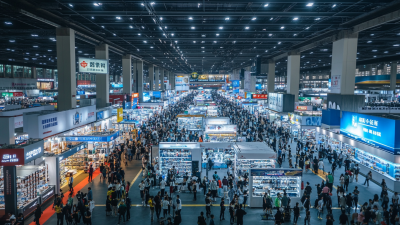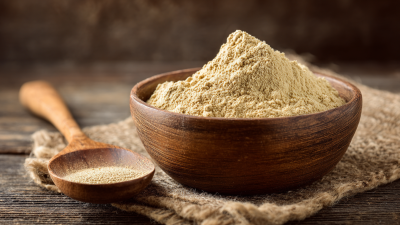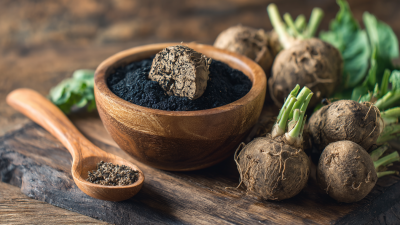
-
Home
-
Products
-
About US
-
FAQ
-
News
-
Tips
-
Contact Us
Leave Your Message
- Phone
- E-mail
- WhatsApp
- WA Business



 The demand for melatonin supplements has surged remarkably in recent years, driven by a global increase in sleep disorders and a growing awareness of the importance of sleep health. According to a report by Grand View Research, the global melatonin market is expected to reach USD 1.2 billion by 2028, expanding at a compound annual growth rate (CAGR) of 7.7%. As consumers increasingly turn to natural alternatives for sleep improvement and anxiety reduction, sourcing high-quality melatonin supplements has become paramount for manufacturers and retailers in the health and wellness industry. This ultimate guide aims to illuminate the key factors in selecting superior melatonin products for diverse global markets, ensuring that businesses can meet consumer demands while maintaining quality and efficacy. By exploring the nuances of ingredient sourcing, supplier reliability, and market trends, we equip industry professionals with the insights needed to thrive in this competitive landscape.
The demand for melatonin supplements has surged remarkably in recent years, driven by a global increase in sleep disorders and a growing awareness of the importance of sleep health. According to a report by Grand View Research, the global melatonin market is expected to reach USD 1.2 billion by 2028, expanding at a compound annual growth rate (CAGR) of 7.7%. As consumers increasingly turn to natural alternatives for sleep improvement and anxiety reduction, sourcing high-quality melatonin supplements has become paramount for manufacturers and retailers in the health and wellness industry. This ultimate guide aims to illuminate the key factors in selecting superior melatonin products for diverse global markets, ensuring that businesses can meet consumer demands while maintaining quality and efficacy. By exploring the nuances of ingredient sourcing, supplier reliability, and market trends, we equip industry professionals with the insights needed to thrive in this competitive landscape.
When sourcing high-quality melatonin supplements for global markets, recognizing key quality indicators is crucial. The first aspect to consider is ingredient sourcing. Look for supplements that contain pure melatonin sourced from reputable manufacturers. Check for third-party testing results to ensure that the product is free from contaminants and adheres to the specified dosage. Additionally, pay attention to the form of melatonin used; while synthetic melatonin is common, some brands may offer plant-based alternatives that cater to different consumer preferences.
Tips: Always verify the company's transparency in sharing their production methods and sourcing practices. A brand that openly provides this information often reflects a commitment to quality. Moreover, ensure that the packaging specifies any certifications, such as GMP (Good Manufacturing Practices) or NSF International certification, which signify compliance with established quality standards.
Another important quality indicator involves the formulation of the supplement itself. Consider whether the melatonin is combined with other active ingredients such as herbs or vitamins that may enhance its efficacy or improve sleep quality. Check for any unnecessary fillers or artificial additives that could compromise the product's integrity. This attention to detail can significantly influence the overall effectiveness of the supplement and its appeal to health-conscious consumers.
When sourcing high-quality melatonin supplements for global markets, understanding regulatory standards in different countries is crucial. Each nation has its own requirements regarding the allowable dosage, labeling, and marketing claims of melatonin products. For instance, in the United States, melatonin is classified as a dietary supplement by the FDA, which means it can be sold without a prescription but must adhere to certain manufacturing practices. Conversely, in countries like Australia, melatonin is classified as a prescription medication, necessitating stricter regulations for its sale.
When navigating these diverse regulatory landscapes, it is essential to consider the following tips. First, always keep abreast of local regulations and potential changes in policies, as these can significantly impact your product offerings. Utilize resources such as government health websites or industry associations to stay informed. Additionally, develop robust relationships with local distributors who understand the landscape and can guide you through compliance.
Another key point is to ensure that your melatonin products undergo proper testing and certification. Always look for third-party testing to confirm quality and safety. This not only helps in complying with regulatory standards but also builds trust with consumers who are increasingly concerned about the efficacy and purity of dietary supplements.
When sourcing high-quality melatonin supplements, evaluating supplier credentials is paramount. The global market for melatonin is projected to reach $1.35 billion by 2028, growing at a CAGR of approximately 8.5% from 2021 to 2028, according to a report by Grand View Research. In this competitive landscape, the credibility of suppliers can significantly influence the quality and efficacy of the final product. It is essential to examine their certifications, such as cGMP (current Good Manufacturing Practices) and FDA registrations, as these ensure compliance with stringent quality standards.

Moreover, understanding the supplier's sourcing practices for raw materials is critical. Melatonin is often derived from natural sources or synthetic processes, and it's crucial to know the origins of these ingredients. For instance, suppliers should provide transparency about their supply chain, including where they source their melatonin and the testing protocols they use. A comprehensive analysis of third-party testing results can further validate the purity and potency of the supplement. In an industry where consumer health is at stake, prioritizing reputable suppliers not only protects brand integrity but also builds trust with discerning customers looking for quality assurance in their melatonin supplements.
The global demand for melatonin supplements is on the rise, reflecting a growing awareness of the health benefits that this natural sleep aid provides. As consumers increasingly seek solutions for sleep disorders and overall wellness, the market for melatonin is set to expand significantly. Recent analyses indicate that the dietary supplements market in Japan is experiencing notable growth, driven by various forms of supplementation, including tablets, capsules, and liquids. This trend illustrates not only the popularity of melatonin but also highlights a broader shift towards health-conscious consumer behavior.
Alongside melatonin, the brain health supplements market is gaining traction, with projections estimating growth from USD 5.16 billion in 2024 to USD 9.15 billion by 2033. This equates to a substantial compound annual growth rate (CAGR) of 6.6%. As consumers become more invested in cognitive enhancement, brain health supplements, including nootropics and herbal extracts, are gaining attention. The synergy between sleep aids like melatonin and cognitive support supplements presents a unique opportunity for brands to cater to consumers' holistic health needs, emphasizing the importance of quality sourcing and product differentiation in this competitive landscape.

When sourcing high-quality melatonin supplements for global markets, understanding the significance of certifications such as Good Manufacturing Practices (GMP) and organic certifications is essential. GMP ensures that products are consistently produced and controlled according to quality standards, which helps mitigate risks in production and guarantees that melatonin supplements are safe for consumers. Look for suppliers who are GMP-certified, as this indicates their commitment to maintaining rigorous manufacturing processes and quality control systems, establishing a strong foundation for consumer trust.
In addition to GMP, organic certifications serve an equally important role in the sourcing process. With an increasing number of consumers prioritizing health and sustainability, organic-certified melatonin supplements not only appeal to this demographic but also confirm that the raw materials used are free from harmful pesticides and synthetic fertilizers. This attention to organic practices reflects a commitment to environmental responsibility and supports the growing trend towards natural and holistic health solutions. Therefore, when selecting suppliers, verifying both GMP and organic certifications can significantly elevate the quality and marketability of melatonin products in a competitive global landscape.





